Ethics and Sustainability: Analyzing Ethical Issues in the Workplace
VerifiedAdded on 2022/09/18
|6
|1551
|36
Essay
AI Summary
This essay delves into the critical intersection of ethics and sustainability within a professional context. The student begins by defining ethics and its influence on decision-making, subsequently addressing two primary ethical issues: economic inequality and workplace diversity. These issues are analyzed through the lens of relevant ethical frameworks, including Kantian Fairness/Justice and The Rights Approach, demonstrating how these frameworks can guide ethical decision-making. The core of the essay lies in a reflective analysis of how understanding these ethical principles shapes the student's anticipated future workplace behavior. This includes an exploration of how personal values, ethical reasoning, and adherence to professional codes of conduct will influence their actions. The essay also considers the impact of senior management, corporate governance, and organizational culture on ethical conduct, and concludes by highlighting the role of ethical codes of conduct in establishing an ethical workplace environment.
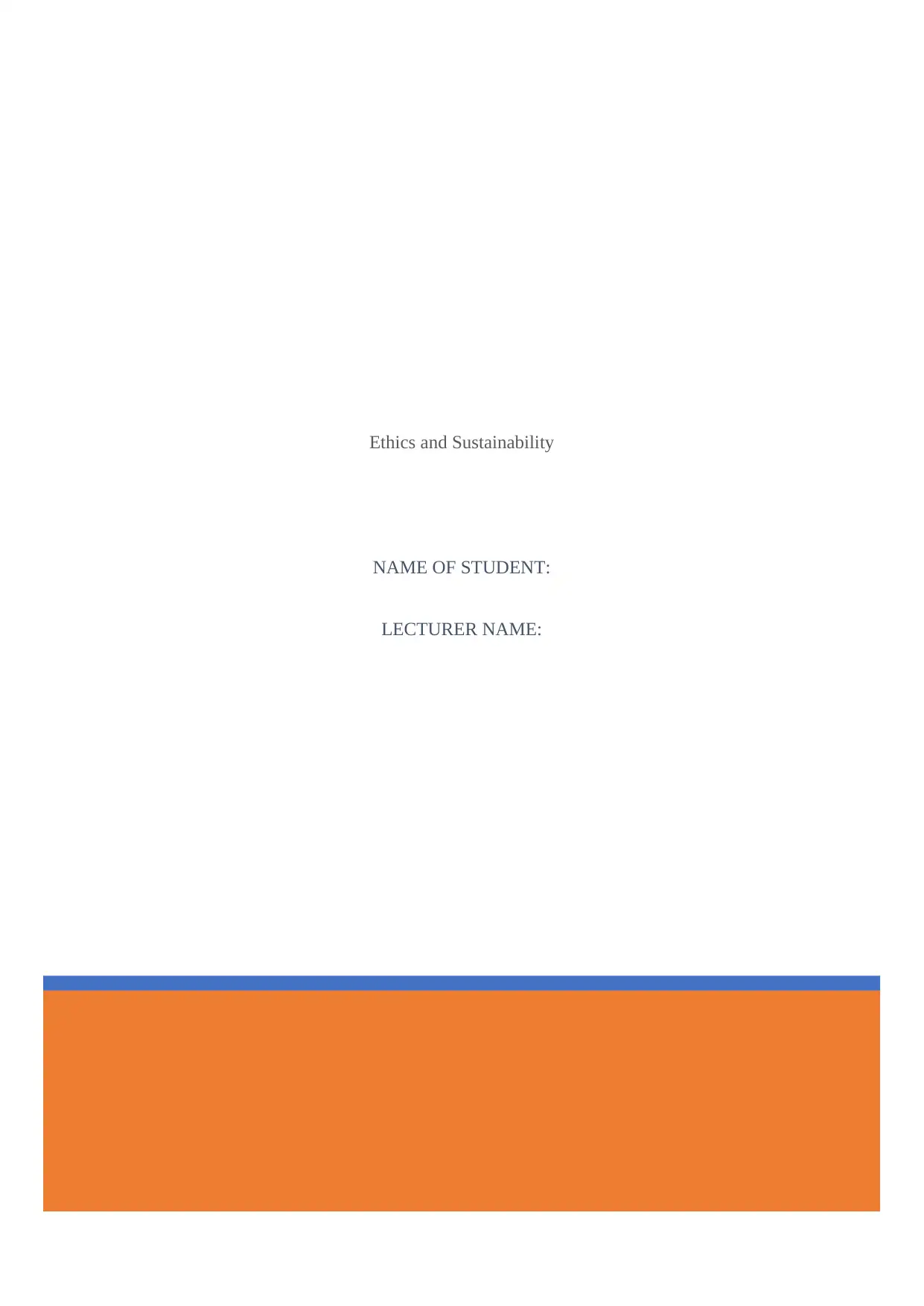
Ethics and Sustainability
NAME OF STUDENT:
LECTURER NAME:
NAME OF STUDENT:
LECTURER NAME:
Paraphrase This Document
Need a fresh take? Get an instant paraphrase of this document with our AI Paraphraser
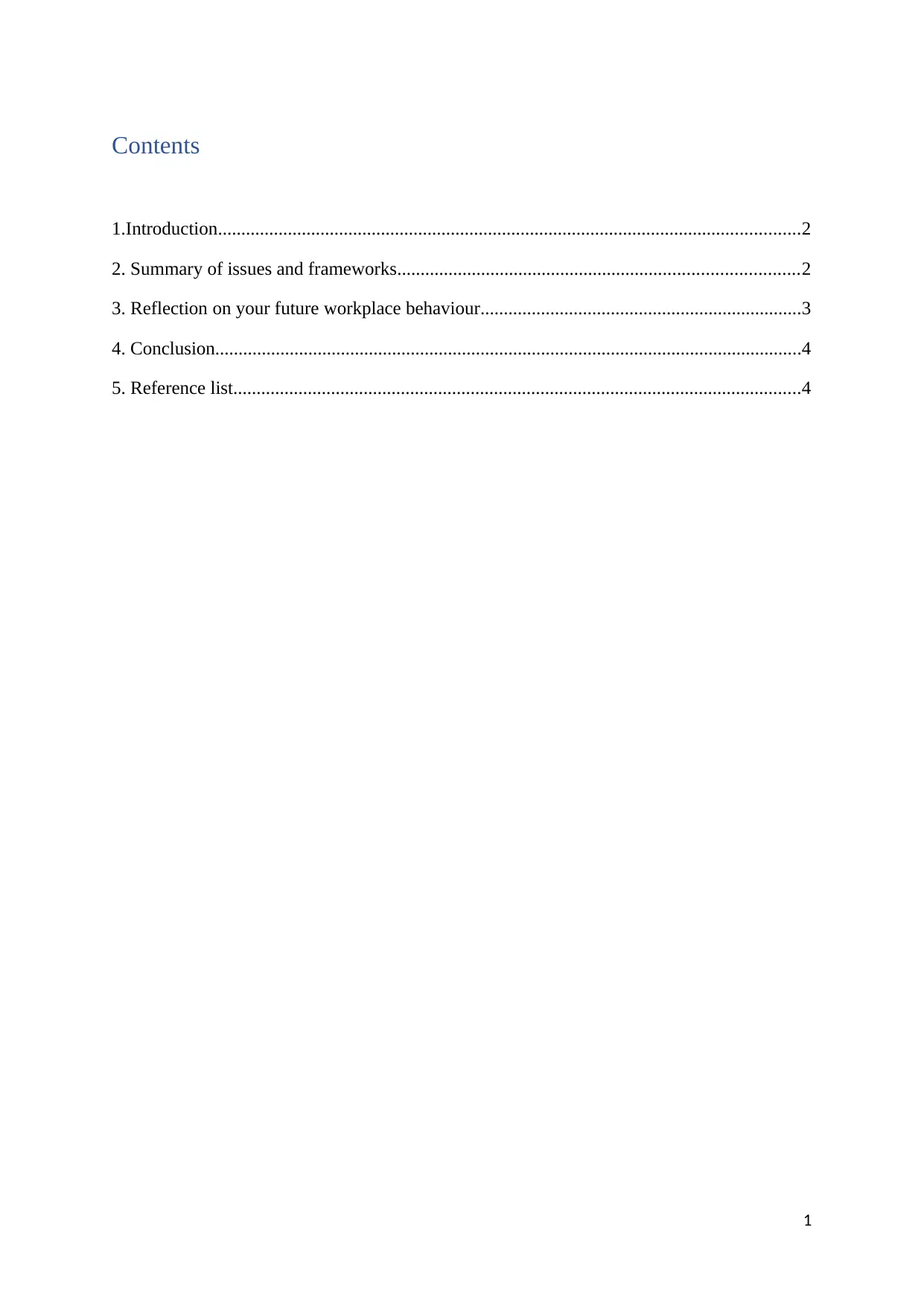
Contents
1.Introduction.............................................................................................................................2
2. Summary of issues and frameworks......................................................................................2
3. Reflection on your future workplace behaviour.....................................................................3
4. Conclusion..............................................................................................................................4
5. Reference list..........................................................................................................................4
1
1.Introduction.............................................................................................................................2
2. Summary of issues and frameworks......................................................................................2
3. Reflection on your future workplace behaviour.....................................................................3
4. Conclusion..............................................................................................................................4
5. Reference list..........................................................................................................................4
1
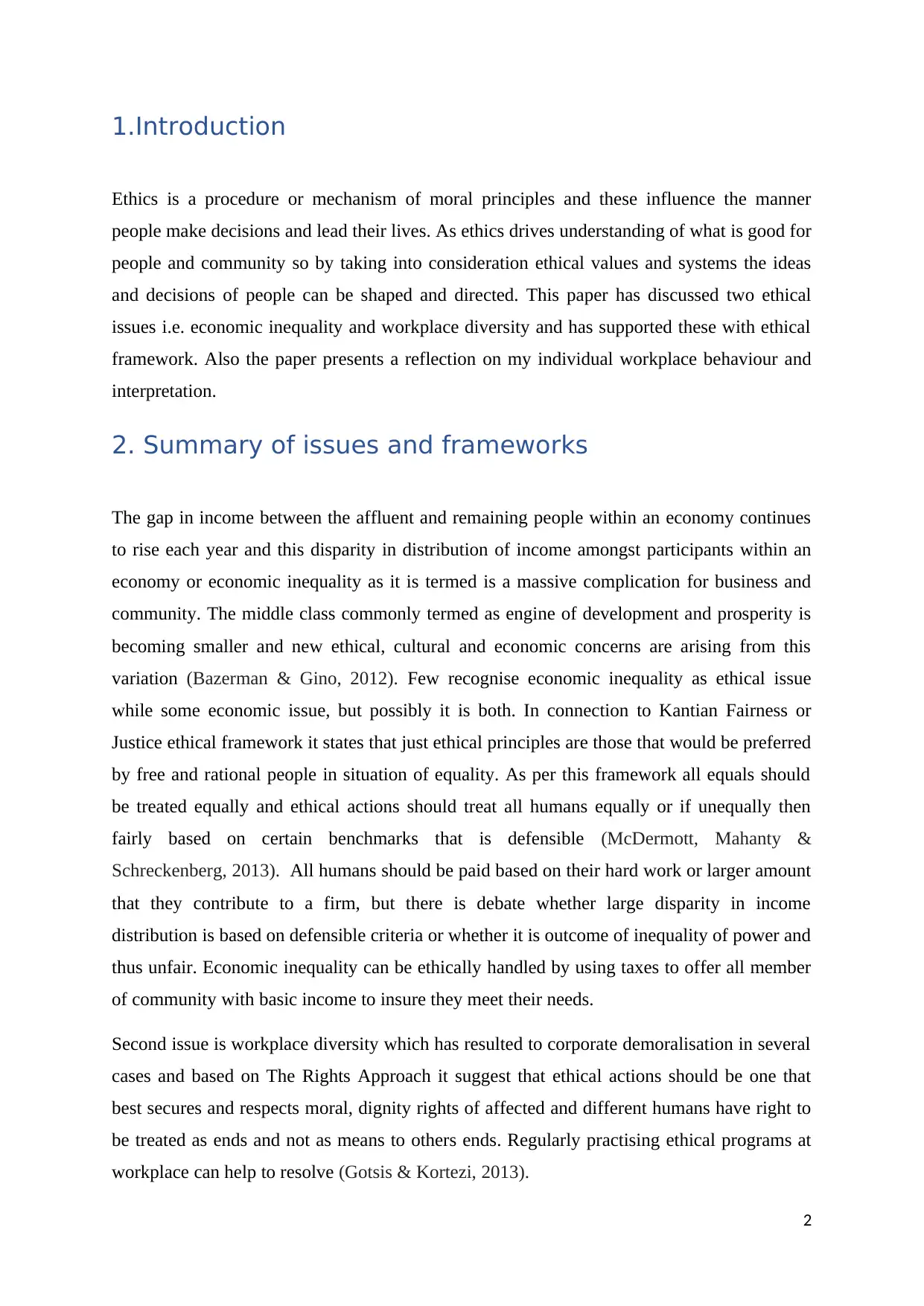
1.Introduction
Ethics is a procedure or mechanism of moral principles and these influence the manner
people make decisions and lead their lives. As ethics drives understanding of what is good for
people and community so by taking into consideration ethical values and systems the ideas
and decisions of people can be shaped and directed. This paper has discussed two ethical
issues i.e. economic inequality and workplace diversity and has supported these with ethical
framework. Also the paper presents a reflection on my individual workplace behaviour and
interpretation.
2. Summary of issues and frameworks
The gap in income between the affluent and remaining people within an economy continues
to rise each year and this disparity in distribution of income amongst participants within an
economy or economic inequality as it is termed is a massive complication for business and
community. The middle class commonly termed as engine of development and prosperity is
becoming smaller and new ethical, cultural and economic concerns are arising from this
variation (Bazerman & Gino, 2012). Few recognise economic inequality as ethical issue
while some economic issue, but possibly it is both. In connection to Kantian Fairness or
Justice ethical framework it states that just ethical principles are those that would be preferred
by free and rational people in situation of equality. As per this framework all equals should
be treated equally and ethical actions should treat all humans equally or if unequally then
fairly based on certain benchmarks that is defensible (McDermott, Mahanty &
Schreckenberg, 2013). All humans should be paid based on their hard work or larger amount
that they contribute to a firm, but there is debate whether large disparity in income
distribution is based on defensible criteria or whether it is outcome of inequality of power and
thus unfair. Economic inequality can be ethically handled by using taxes to offer all member
of community with basic income to insure they meet their needs.
Second issue is workplace diversity which has resulted to corporate demoralisation in several
cases and based on The Rights Approach it suggest that ethical actions should be one that
best secures and respects moral, dignity rights of affected and different humans have right to
be treated as ends and not as means to others ends. Regularly practising ethical programs at
workplace can help to resolve (Gotsis & Kortezi, 2013).
2
Ethics is a procedure or mechanism of moral principles and these influence the manner
people make decisions and lead their lives. As ethics drives understanding of what is good for
people and community so by taking into consideration ethical values and systems the ideas
and decisions of people can be shaped and directed. This paper has discussed two ethical
issues i.e. economic inequality and workplace diversity and has supported these with ethical
framework. Also the paper presents a reflection on my individual workplace behaviour and
interpretation.
2. Summary of issues and frameworks
The gap in income between the affluent and remaining people within an economy continues
to rise each year and this disparity in distribution of income amongst participants within an
economy or economic inequality as it is termed is a massive complication for business and
community. The middle class commonly termed as engine of development and prosperity is
becoming smaller and new ethical, cultural and economic concerns are arising from this
variation (Bazerman & Gino, 2012). Few recognise economic inequality as ethical issue
while some economic issue, but possibly it is both. In connection to Kantian Fairness or
Justice ethical framework it states that just ethical principles are those that would be preferred
by free and rational people in situation of equality. As per this framework all equals should
be treated equally and ethical actions should treat all humans equally or if unequally then
fairly based on certain benchmarks that is defensible (McDermott, Mahanty &
Schreckenberg, 2013). All humans should be paid based on their hard work or larger amount
that they contribute to a firm, but there is debate whether large disparity in income
distribution is based on defensible criteria or whether it is outcome of inequality of power and
thus unfair. Economic inequality can be ethically handled by using taxes to offer all member
of community with basic income to insure they meet their needs.
Second issue is workplace diversity which has resulted to corporate demoralisation in several
cases and based on The Rights Approach it suggest that ethical actions should be one that
best secures and respects moral, dignity rights of affected and different humans have right to
be treated as ends and not as means to others ends. Regularly practising ethical programs at
workplace can help to resolve (Gotsis & Kortezi, 2013).
2
⊘ This is a preview!⊘
Do you want full access?
Subscribe today to unlock all pages.

Trusted by 1+ million students worldwide
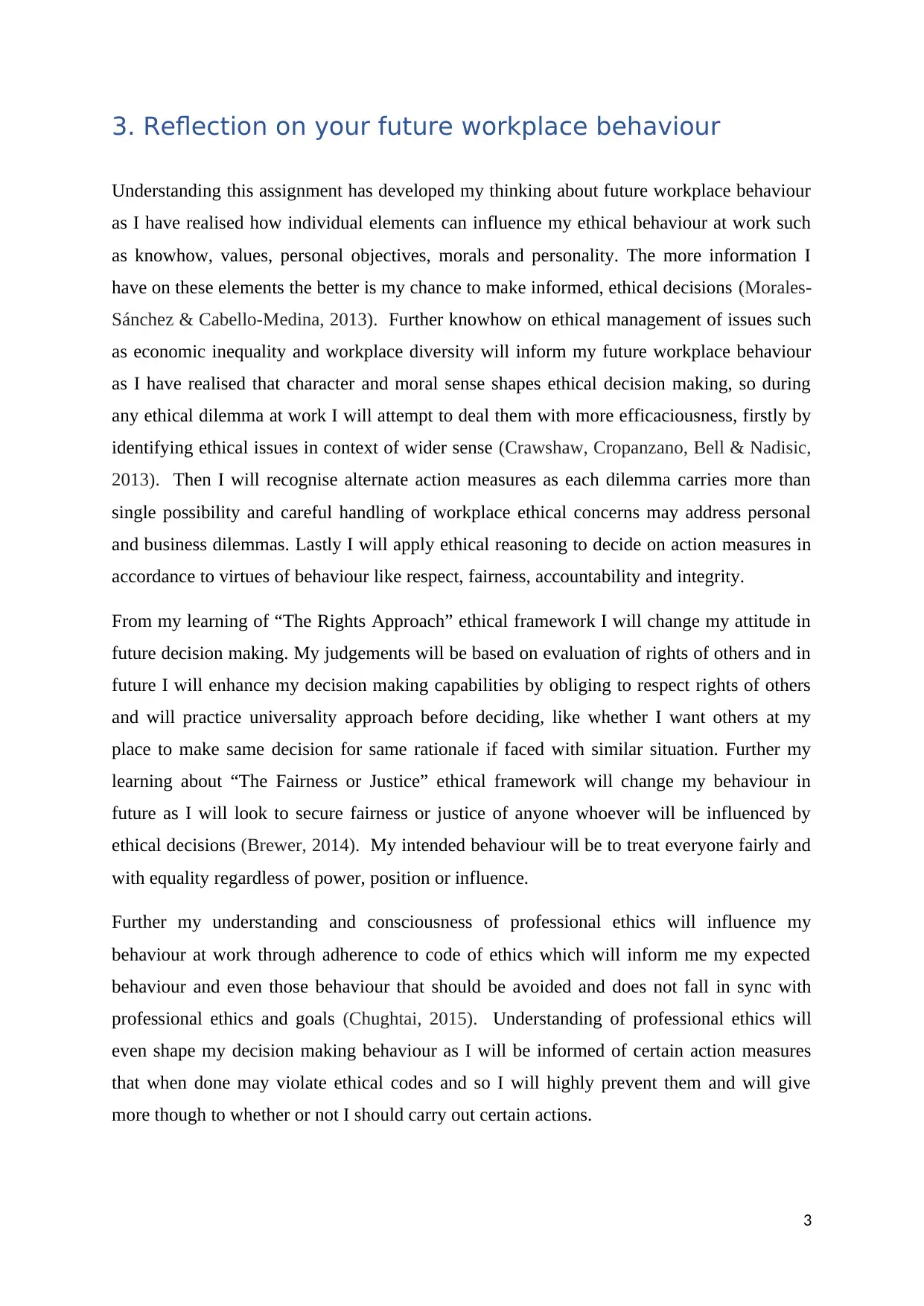
3. Reflection on your future workplace behaviour
Understanding this assignment has developed my thinking about future workplace behaviour
as I have realised how individual elements can influence my ethical behaviour at work such
as knowhow, values, personal objectives, morals and personality. The more information I
have on these elements the better is my chance to make informed, ethical decisions (Morales-
Sánchez & Cabello-Medina, 2013). Further knowhow on ethical management of issues such
as economic inequality and workplace diversity will inform my future workplace behaviour
as I have realised that character and moral sense shapes ethical decision making, so during
any ethical dilemma at work I will attempt to deal them with more efficaciousness, firstly by
identifying ethical issues in context of wider sense (Crawshaw, Cropanzano, Bell & Nadisic,
2013). Then I will recognise alternate action measures as each dilemma carries more than
single possibility and careful handling of workplace ethical concerns may address personal
and business dilemmas. Lastly I will apply ethical reasoning to decide on action measures in
accordance to virtues of behaviour like respect, fairness, accountability and integrity.
From my learning of “The Rights Approach” ethical framework I will change my attitude in
future decision making. My judgements will be based on evaluation of rights of others and in
future I will enhance my decision making capabilities by obliging to respect rights of others
and will practice universality approach before deciding, like whether I want others at my
place to make same decision for same rationale if faced with similar situation. Further my
learning about “The Fairness or Justice” ethical framework will change my behaviour in
future as I will look to secure fairness or justice of anyone whoever will be influenced by
ethical decisions (Brewer, 2014). My intended behaviour will be to treat everyone fairly and
with equality regardless of power, position or influence.
Further my understanding and consciousness of professional ethics will influence my
behaviour at work through adherence to code of ethics which will inform me my expected
behaviour and even those behaviour that should be avoided and does not fall in sync with
professional ethics and goals (Chughtai, 2015). Understanding of professional ethics will
even shape my decision making behaviour as I will be informed of certain action measures
that when done may violate ethical codes and so I will highly prevent them and will give
more though to whether or not I should carry out certain actions.
3
Understanding this assignment has developed my thinking about future workplace behaviour
as I have realised how individual elements can influence my ethical behaviour at work such
as knowhow, values, personal objectives, morals and personality. The more information I
have on these elements the better is my chance to make informed, ethical decisions (Morales-
Sánchez & Cabello-Medina, 2013). Further knowhow on ethical management of issues such
as economic inequality and workplace diversity will inform my future workplace behaviour
as I have realised that character and moral sense shapes ethical decision making, so during
any ethical dilemma at work I will attempt to deal them with more efficaciousness, firstly by
identifying ethical issues in context of wider sense (Crawshaw, Cropanzano, Bell & Nadisic,
2013). Then I will recognise alternate action measures as each dilemma carries more than
single possibility and careful handling of workplace ethical concerns may address personal
and business dilemmas. Lastly I will apply ethical reasoning to decide on action measures in
accordance to virtues of behaviour like respect, fairness, accountability and integrity.
From my learning of “The Rights Approach” ethical framework I will change my attitude in
future decision making. My judgements will be based on evaluation of rights of others and in
future I will enhance my decision making capabilities by obliging to respect rights of others
and will practice universality approach before deciding, like whether I want others at my
place to make same decision for same rationale if faced with similar situation. Further my
learning about “The Fairness or Justice” ethical framework will change my behaviour in
future as I will look to secure fairness or justice of anyone whoever will be influenced by
ethical decisions (Brewer, 2014). My intended behaviour will be to treat everyone fairly and
with equality regardless of power, position or influence.
Further my understanding and consciousness of professional ethics will influence my
behaviour at work through adherence to code of ethics which will inform me my expected
behaviour and even those behaviour that should be avoided and does not fall in sync with
professional ethics and goals (Chughtai, 2015). Understanding of professional ethics will
even shape my decision making behaviour as I will be informed of certain action measures
that when done may violate ethical codes and so I will highly prevent them and will give
more though to whether or not I should carry out certain actions.
3
Paraphrase This Document
Need a fresh take? Get an instant paraphrase of this document with our AI Paraphraser
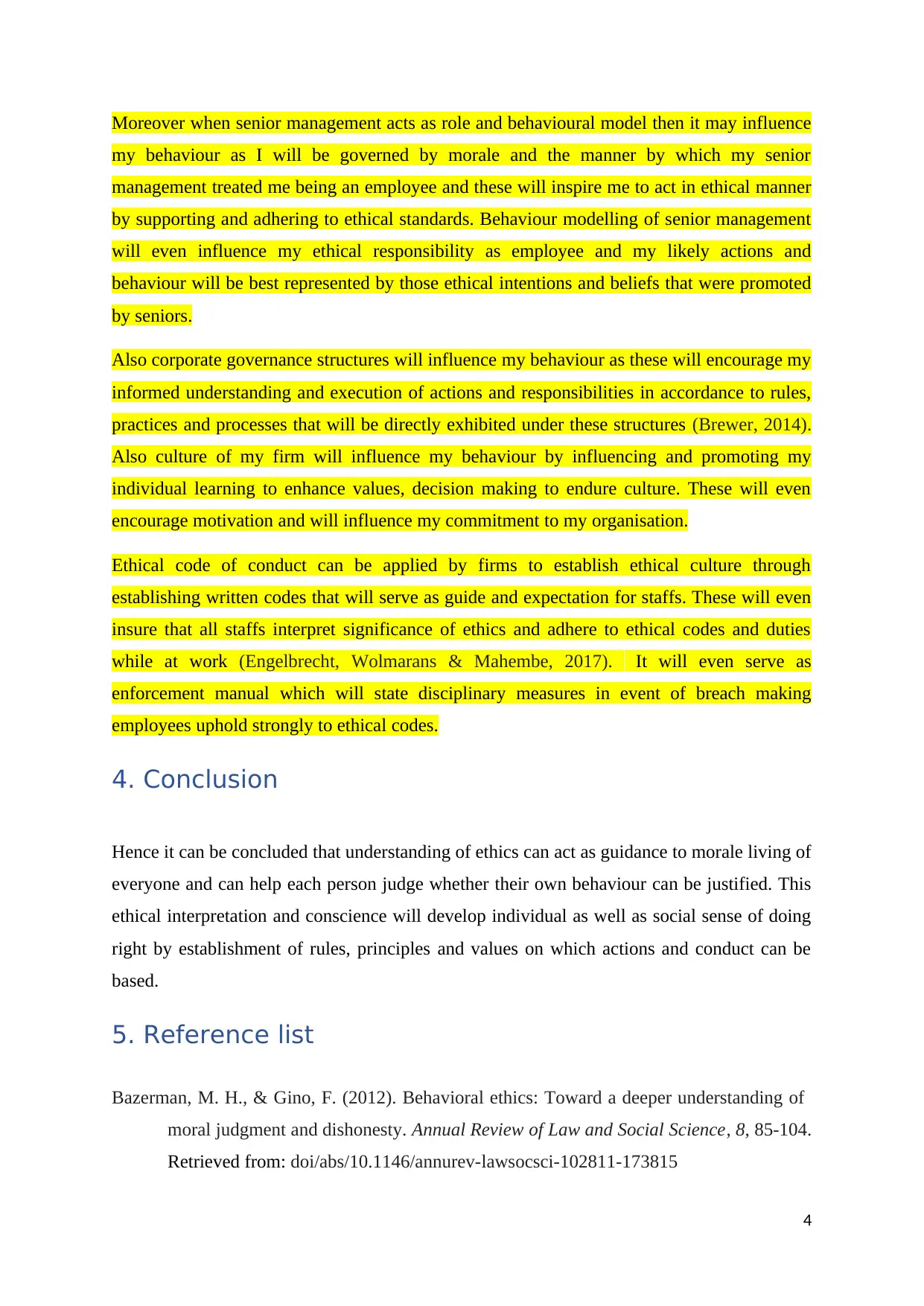
Moreover when senior management acts as role and behavioural model then it may influence
my behaviour as I will be governed by morale and the manner by which my senior
management treated me being an employee and these will inspire me to act in ethical manner
by supporting and adhering to ethical standards. Behaviour modelling of senior management
will even influence my ethical responsibility as employee and my likely actions and
behaviour will be best represented by those ethical intentions and beliefs that were promoted
by seniors.
Also corporate governance structures will influence my behaviour as these will encourage my
informed understanding and execution of actions and responsibilities in accordance to rules,
practices and processes that will be directly exhibited under these structures (Brewer, 2014).
Also culture of my firm will influence my behaviour by influencing and promoting my
individual learning to enhance values, decision making to endure culture. These will even
encourage motivation and will influence my commitment to my organisation.
Ethical code of conduct can be applied by firms to establish ethical culture through
establishing written codes that will serve as guide and expectation for staffs. These will even
insure that all staffs interpret significance of ethics and adhere to ethical codes and duties
while at work (Engelbrecht, Wolmarans & Mahembe, 2017). It will even serve as
enforcement manual which will state disciplinary measures in event of breach making
employees uphold strongly to ethical codes.
4. Conclusion
Hence it can be concluded that understanding of ethics can act as guidance to morale living of
everyone and can help each person judge whether their own behaviour can be justified. This
ethical interpretation and conscience will develop individual as well as social sense of doing
right by establishment of rules, principles and values on which actions and conduct can be
based.
5. Reference list
Bazerman, M. H., & Gino, F. (2012). Behavioral ethics: Toward a deeper understanding of
moral judgment and dishonesty. Annual Review of Law and Social Science, 8, 85-104.
Retrieved from: doi/abs/10.1146/annurev-lawsocsci-102811-173815
4
my behaviour as I will be governed by morale and the manner by which my senior
management treated me being an employee and these will inspire me to act in ethical manner
by supporting and adhering to ethical standards. Behaviour modelling of senior management
will even influence my ethical responsibility as employee and my likely actions and
behaviour will be best represented by those ethical intentions and beliefs that were promoted
by seniors.
Also corporate governance structures will influence my behaviour as these will encourage my
informed understanding and execution of actions and responsibilities in accordance to rules,
practices and processes that will be directly exhibited under these structures (Brewer, 2014).
Also culture of my firm will influence my behaviour by influencing and promoting my
individual learning to enhance values, decision making to endure culture. These will even
encourage motivation and will influence my commitment to my organisation.
Ethical code of conduct can be applied by firms to establish ethical culture through
establishing written codes that will serve as guide and expectation for staffs. These will even
insure that all staffs interpret significance of ethics and adhere to ethical codes and duties
while at work (Engelbrecht, Wolmarans & Mahembe, 2017). It will even serve as
enforcement manual which will state disciplinary measures in event of breach making
employees uphold strongly to ethical codes.
4. Conclusion
Hence it can be concluded that understanding of ethics can act as guidance to morale living of
everyone and can help each person judge whether their own behaviour can be justified. This
ethical interpretation and conscience will develop individual as well as social sense of doing
right by establishment of rules, principles and values on which actions and conduct can be
based.
5. Reference list
Bazerman, M. H., & Gino, F. (2012). Behavioral ethics: Toward a deeper understanding of
moral judgment and dishonesty. Annual Review of Law and Social Science, 8, 85-104.
Retrieved from: doi/abs/10.1146/annurev-lawsocsci-102811-173815
4
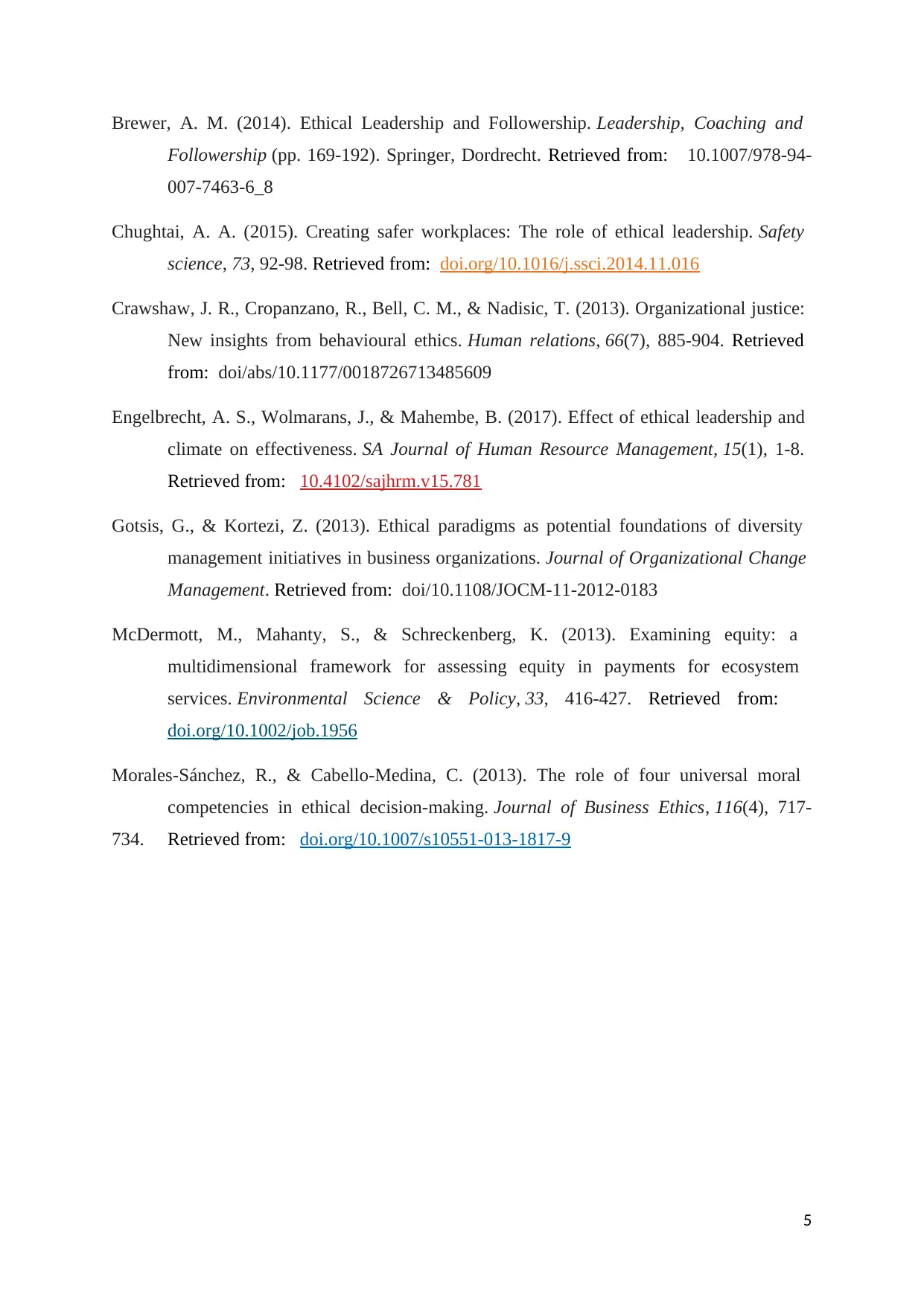
Brewer, A. M. (2014). Ethical Leadership and Followership. Leadership, Coaching and
Followership (pp. 169-192). Springer, Dordrecht. Retrieved from: 10.1007/978-94-
007-7463-6_8
Chughtai, A. A. (2015). Creating safer workplaces: The role of ethical leadership. Safety
science, 73, 92-98. Retrieved from: doi.org/10.1016/j.ssci.2014.11.016
Crawshaw, J. R., Cropanzano, R., Bell, C. M., & Nadisic, T. (2013). Organizational justice:
New insights from behavioural ethics. Human relations, 66(7), 885-904. Retrieved
from: doi/abs/10.1177/0018726713485609
Engelbrecht, A. S., Wolmarans, J., & Mahembe, B. (2017). Effect of ethical leadership and
climate on effectiveness. SA Journal of Human Resource Management, 15(1), 1-8.
Retrieved from: 10.4102/sajhrm.v15.781
Gotsis, G., & Kortezi, Z. (2013). Ethical paradigms as potential foundations of diversity
management initiatives in business organizations. Journal of Organizational Change
Management. Retrieved from: doi/10.1108/JOCM-11-2012-0183
McDermott, M., Mahanty, S., & Schreckenberg, K. (2013). Examining equity: a
multidimensional framework for assessing equity in payments for ecosystem
services. Environmental Science & Policy, 33, 416-427. Retrieved from:
doi.org/10.1002/job.1956
Morales-Sánchez, R., & Cabello-Medina, C. (2013). The role of four universal moral
competencies in ethical decision-making. Journal of Business Ethics, 116(4), 717-
734. Retrieved from: doi.org/10.1007/s10551-013-1817-9
5
Followership (pp. 169-192). Springer, Dordrecht. Retrieved from: 10.1007/978-94-
007-7463-6_8
Chughtai, A. A. (2015). Creating safer workplaces: The role of ethical leadership. Safety
science, 73, 92-98. Retrieved from: doi.org/10.1016/j.ssci.2014.11.016
Crawshaw, J. R., Cropanzano, R., Bell, C. M., & Nadisic, T. (2013). Organizational justice:
New insights from behavioural ethics. Human relations, 66(7), 885-904. Retrieved
from: doi/abs/10.1177/0018726713485609
Engelbrecht, A. S., Wolmarans, J., & Mahembe, B. (2017). Effect of ethical leadership and
climate on effectiveness. SA Journal of Human Resource Management, 15(1), 1-8.
Retrieved from: 10.4102/sajhrm.v15.781
Gotsis, G., & Kortezi, Z. (2013). Ethical paradigms as potential foundations of diversity
management initiatives in business organizations. Journal of Organizational Change
Management. Retrieved from: doi/10.1108/JOCM-11-2012-0183
McDermott, M., Mahanty, S., & Schreckenberg, K. (2013). Examining equity: a
multidimensional framework for assessing equity in payments for ecosystem
services. Environmental Science & Policy, 33, 416-427. Retrieved from:
doi.org/10.1002/job.1956
Morales-Sánchez, R., & Cabello-Medina, C. (2013). The role of four universal moral
competencies in ethical decision-making. Journal of Business Ethics, 116(4), 717-
734. Retrieved from: doi.org/10.1007/s10551-013-1817-9
5
⊘ This is a preview!⊘
Do you want full access?
Subscribe today to unlock all pages.

Trusted by 1+ million students worldwide
1 out of 6
Related Documents
Your All-in-One AI-Powered Toolkit for Academic Success.
+13062052269
info@desklib.com
Available 24*7 on WhatsApp / Email
![[object Object]](/_next/static/media/star-bottom.7253800d.svg)
Unlock your academic potential
Copyright © 2020–2025 A2Z Services. All Rights Reserved. Developed and managed by ZUCOL.




